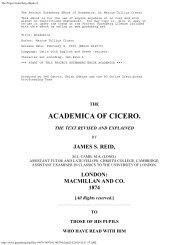From Farm House to the White House - 912 Freedom Library
From Farm House to the White House - 912 Freedom Library
From Farm House to the White House - 912 Freedom Library
You also want an ePaper? Increase the reach of your titles
YUMPU automatically turns print PDFs into web optimized ePapers that Google loves.
<strong>Farm</strong> <strong>House</strong> <strong>to</strong> <strong>the</strong> <strong>White</strong> <strong>House</strong>, by William M. Thayer 193<br />
country. He designed <strong>to</strong> spend <strong>the</strong> remainder of his days in retirement at Mount Vernon. His large estates<br />
demanded his attention, and his tastes for agricultural pursuits adapted him <strong>to</strong> <strong>the</strong> situation.<br />
Under his careful and efficient supervision, his Mount Vernon estate rapidly improved. He enlarged his house,<br />
so that he might accommodate <strong>the</strong> numerous distinguished visi<strong>to</strong>rs who now paid him <strong>the</strong>ir respects. He<br />
studied agriculture by consulting <strong>the</strong> best authorities, doing it not alone for <strong>the</strong> purpose of improving his own<br />
estates, but also <strong>to</strong> aid his newly emancipated country in developing its resources.<br />
He lent his great influence <strong>to</strong> educational and religious enterprises, so essential <strong>to</strong> <strong>the</strong> stability and progress of<br />
<strong>the</strong> free and independent Colonies. Through his influence, two companies were organized <strong>to</strong> extend <strong>the</strong><br />
navigation of <strong>the</strong> James and Po<strong>to</strong>mac rivers. Grateful for his aid in creating enterprises of so great public<br />
benefit, <strong>the</strong> General Assembly presented him with one hundred and fifty shares of <strong>the</strong> s<strong>to</strong>ck, worth fifty<br />
thousand dollars. He declined <strong>to</strong> accept <strong>the</strong> large gift, saying:<br />
"What will <strong>the</strong> world think if <strong>the</strong>y should hear that I have taken fifty thousand dollars for this affair? Will <strong>the</strong>y<br />
not suspect, on my next proposition, that money is my motive? Thus for <strong>the</strong> sake of money, which, indeed, I<br />
never coveted from my country, I may lose <strong>the</strong> power <strong>to</strong> do her some service, which may be worth more than<br />
all money."<br />
He assured <strong>the</strong> Assembly that if <strong>the</strong>y would contribute <strong>the</strong> amount for a national university in what is now <strong>the</strong><br />
District of Columbia, and a literary institution in Rockbridge County, since called Washing<strong>to</strong>n College, he<br />
should esteem <strong>the</strong>ir gift even more than he would were he <strong>to</strong> accept and devote it <strong>to</strong> his own private use; and<br />
<strong>the</strong>y complied with his wishes.<br />
As before <strong>the</strong> war, he continued <strong>to</strong> remember <strong>the</strong> poor, whose veneration for him was greater than ever. His<br />
methods of assisting <strong>the</strong>m were often original, and always practical; as, for example, keeping a boat on <strong>the</strong><br />
Po<strong>to</strong>mac for <strong>the</strong>ir use in fishing. Here was an opportunity for <strong>the</strong>m <strong>to</strong> obtain subsistence without sacrificing<br />
<strong>the</strong> virtues of industry and self-reliance.<br />
Mr. Peake, who had charge of one of his plantations, said:<br />
"I had orders <strong>to</strong> fill a corn-house every year for <strong>the</strong> sole use of <strong>the</strong> poor in my neighborhood, <strong>to</strong> whom it was a<br />
seasonable and most precious relief, saving numbers of poor women and children from miserable famine, and<br />
blessing <strong>the</strong>m with a cheerful plenteousness of bread."<br />
One year, when <strong>the</strong>re was a scarcity of corn, and <strong>the</strong> price of it went up <strong>to</strong> a dollar per bushel, <strong>the</strong> suffering<br />
among <strong>the</strong> poor was much increased. Washing<strong>to</strong>n ordered his agent <strong>to</strong> distribute all that could be spared from<br />
<strong>the</strong> granaries, and he purchased several hundred bushels in addition, at <strong>the</strong> high price, <strong>to</strong> be used in charity.<br />
Governor Johnson of Maryland, a hero of '76, related <strong>the</strong> following incident <strong>to</strong> Mr. Weems:<br />
The governor went <strong>to</strong> <strong>the</strong> Virginia Springs for his health. The place was crowded with people, but he secured<br />
"a mattress in <strong>the</strong> hut of a very honest baker" whom he knew. The baker did a large business, and every day<br />
Mr. Johnson noticed that many poor negroes came for loaves, and <strong>to</strong>ok <strong>the</strong>m away without paying a cent.<br />
"S<strong>to</strong>phel," said Mr. Johnson one day, "you seem <strong>to</strong> sell a world of bread here every day, but notwithstanding<br />
that, I fear you don't gain much by it."<br />
"What makes you think so?" replied S<strong>to</strong>phel.<br />
"You credit <strong>to</strong>o much."















